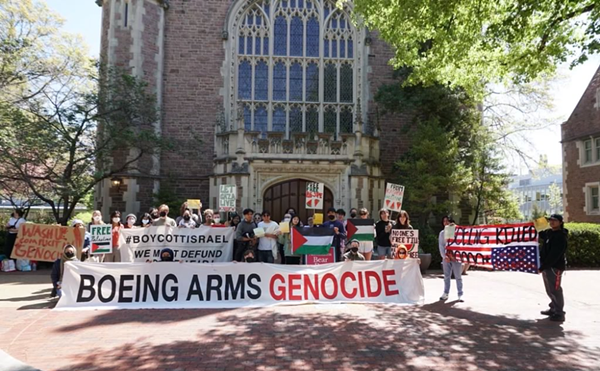Facing a potentially embarrassing trial in a wrongful-termination lawsuit, Enterprise recently asked a judge to, in effect, slam the courtroom doors shut. Not only does the company want the jury sequestered (that is, holed up for the duration of the trial), it asked a judge to bar the public from attending.
In other words, according to one of Enterprise's lawyers: "Exclude people who are not necessary to the proceeding." No inquisitive Enterprise employees, no competitors and absolutely, positively no reporters. Worms, other than ones already representing the parties, definitely aren't welcome in St. Louis County Circuit Court.
It's just the kind of ballsy, to-hell-with-everybody-else move that has propelled the privately held St. Louis company to the top of the nation's car-rental heap. According to court records, the company says that its local status "ensures a high level of publicity will be attached to the case." To back up the argument, Enterprise cites a story about the case that appeared in this very newspaper [Geri L. Dreiling, "Blood in the Water," July 17].
In his lawsuit, former Enterprise controller and vice president Thomas P. Dunn alleges that he was fired for raising questions about Enterprise's business practices, including overbilling customers for repairs, levying deceptive surcharges on customers and registering vehicles in a manner to avoid paying sales tax.
But one of Dunn's key allegations is that he crossed swords with company founder Jack Taylor and his son, chairman and chief executive officer Andy Taylor, over the question of how vehicles in the Enterprise fleet should be depreciated.
Dunn claims Jack Taylor personally insisted on a lower, more conservative value for the vehicles -- a move Dunn and his lawyers argue would have benefited current shareholders, including the Taylors, if the company were to proceed with plans to go public. Plans for an initial public offering were later shelved, and in January 2001 Dunn was fired from his $650,000-a-year job.
The suit portrays Dunn as a whistleblower whose rigid defense of proper accounting practices made him the odd man out at a company where things weren't always done by the book. Executives for Enterprise, however, have testified that Dunn was a highly compensated top executive whose termination was prompted by complaints about his abusive management style. The company, in its court filings, has vigorously denied Dunn's claims about improper business practices.
Whatever the outcome, Dunn's suit has threatened to crack open the tight lid on Enterprise's operations. Not only have personnel matters been discussed in open court, but Dunn's lawyers have gone after sensitive records -- just the kind of stuff Hertz and Avis would love to get their hands on.
But there's a much, much bigger issue at stake for Enterprise: The company doesn't want the income and holdings of its top execs and shareholders made public. "We don't think it's fair for the individuals in this community to have that information in the newspapers about how much money they make," says Michael A. Kahn, Enterprise's California lawyer.
One of Dunn's sharks, Lisa Van Amburg, counters that revealing how much the Taylors and other top Enterprisers make and own is critical to understanding how they would have benefited from a public offering. Argues Van Amburg: "If the company is going to parade employees on the stand to criticize our client, I think the jury is entitled to hear what money they are making, what might bias their testimony in favor of the defendant [Enterprise] here."
Enterprise has legitimate reasons to worry about the trial offering up tantalizing details -- even if the local daily declines to report them. At a hearing this past summer, Dunn testified that he'd raised concerns about the company's corporate aircraft's being used to fly Jack Taylor to catch his private yacht. Though a Post-Dispatch reporter was present, the paper made no mention of that tasty tidbit.
The Dunn case has been marked by an unusual degree of acrimony among the lawyers. In court, Van Amburg has a knack for dropping references to "cooked books" and the Enron debacle -- comments that drive Kahn crazy.
"The strategy is clear," the latter sputtered at a recent hearing. "Try to make our salaries in the newspapers, call us 'Enron,' declare we're 'cooking the books' -- not try the case of wrongful termination of a controller of a private company."
If that tactic sounds like dirty tricks, consider what Dunn's lawyers claim may have happened to a key witness.
At a recent hearing, Van Amburg said that a local partner at Ernst & Young complained to St. Louis University about Dr. James Jennings, a tenured professor of accounting. Jennings is an expert witness for Dunn; Ernst & Young is the accounting firm that worked on Enterprise's planned public offering.
The letter, written by Stan Deptula, noted that his firm was upset that Jennings had referred in class to an audit Ernst & Young had conducted at a Chicago bank. Deptula advised that Ernst & Young's partners were withholding alumni contributions to SLU. But Deptula's real goal may have been to discourage Jennings' planned testimony in the Enterprise case, Van Amburg alleged.
"It seems rather suspicious that on the eve of our trial, our expert would be called on the carpet for something like this," Van Amburg told a judge. Enterprise's lawyers acknowledged that Ernst & Young had threatened to cut off donations to SLU but insisted that this was unrelated to the Enterprise case. Jennings declined to comment; Deptula did not return a call.
The trial is set to begin Thursday.





